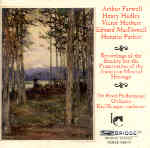The quarter century emcompassed by this extraordinary collection (1890-1916) represents the coming of age in American music, when composers stopped writing fake Mendelssohn and (at best) Brahms, and began writing fake Liszt, Wagner and Strauss. In other words, an “American” voice has yet to emerge, but in terms of sheer technical sophistication the music achieves a measure of parity with contemporary European models and even begins to assert a degree of originality and independence. Of course, all of these pieces are enjoyable and well worth hearing, never mind questions of historical importance. And with only a couple of exceptions most of this music isn’t otherwise available, so collectors will welcome this issue as a matter of course.
MacDowell’s two suites are available in lighter, fleeter, better recorded performances from Naxos, though some may well prefer conductor Karl Krueger’s more luxurious view of the “Indian” Suite. Lorin Maazel and the Pittsburgh Symphony recorded a sensational performance of Herbert’s Hero and Leander for Sony, but God only knows how long that will be available and the coupling is a less than snazzy ramble through Grofé’s Grand Canyon Suite. All the rest of this music is new to disc. Horatio Parker is best known (to the extent he is known at all) as the teacher of Charles Ives and as the composer of a rather dull sacred oratorio. His symphonic poem Vathek is so lush and sexy that he was apparently embarrassed by it and failed to include it in his complete list of works. Certainly he wrote nothing else similar, and nothing better.
Arthur Farwell’s suite The Gods of the Mountain concludes with a remarkable movement entitled “The Stone Gods Come,” an exercise in granitic sonority that wouldn’t be out of place coming from Holst or John Foulds. It’s an eccentric inspiration in the best sense, and truly original. Henry Hadley’s Second Symphony “The Four Seasons” may strike some as a bit predictable and overlong for its material, but the “Autumn” ending works very effectively, and the symphonic poem Salome offers a predictably entertaining essay in late Romantic decadence. All of this rare music gets sympathetic playing and conducting and the early 60s sound has cleaned up very well. If Krueger doesn’t always conjur the last ounce of excitement that’s only to be expected given the unfamiliarity of the repertoire. Most collectors will simply be glad to have these pieces in such comfortably enjoyable performances.
































